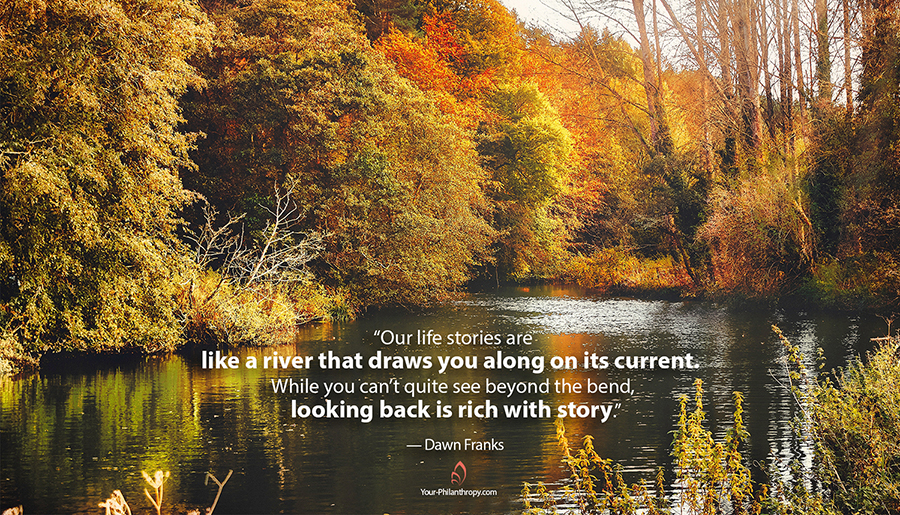The everyday life you live is the legacy you leave. Yes, the stories of our lives become our legacy. We have no choice in the matter. Others look at the trail we walked, the life journey we are on and see a legacy.
The very nature of a legacy is storytelling. Our life stories are like a river that draws you along on its current. While you can’t quite see beyond the bend, looking back is rich with story.
I’m currently reading the book, Life is in the Transitions: We Can Manage them Better by Bruce Feiler. Struck by Feiler’s description of the Life Story Project, in which he interviewed hundreds of people from age 20 to 90 across all fifty states, I began reflecting on what it means to leave a legacy.
Here are some of my questions:
- Who leaves a legacy?
- Do we have any choice in the legacy we leave?
- Can we write our legacy and then live it out?
Although Feiler’s Life Story Project focuses on life’s transitions, from unexpected or planned to what he calls ‘lifequake’ transitions, it occurred to me that every person has a lived experience that is only theirs and it becomes their legacy. Much like my belief that we each have our own Giving Fingerprints, unlike anyone else’s, we also each create a legacy even when we would rather not.
This story is instructive.
While researching, I found what I think is a hilarious quote from Bill Gates about legacies in an interview with Caroline Graham, June 11, 2011. Here’s what he said, “Legacy is a stupid thing. I don’t want a legacy.”
Really?
How is it possible that one of the world’s richest men, and possibly the most written about, interviewed, and quoted individuals, could imagine that he is not leaving a legacy? Books and articles have been written and will continue to be. It’s likely one or more will have the word legacy in the title.
Gates spends a great deal of time now focused on using his billions through the Bill and Melinda Gates Foundation to impact global health and U.S. high schools and post-secondary schools.
In the same interview, he provides us with insight into how he thinks about the work-life stories he is leaving behind for us to unravel.
“If people look and see that childhood deaths dropped from nine million a year to four million because of our investment, then wow! I liken what I’m doing now to my old job. I worked with a lot of smart people; some things went well; some didn’t go so well. But when you see how what we did ended up empowering people, it’s a very cool thing.”
What most got my attention here is his reference to “some things went well; some didn’t go so well.” That is the truth of any legacy, any lived experiences.
The stories we leave behind every day are just that – everyday stories. Some things go well – some not so well.
Woven into those stories and events are the gifts, donations, and the ways we volunteered to make a difference for someone else. It includes our hopes for the future and efforts to curate the stories most remembered by others.
Here are a few questions to ask yourself about what you think others see – clues to the legacy you are leaving.
- When others view your life, what high points and low points will they see?
- What will they say was the most meaningful to you? Experiences, events, your own unique style of giving – your Giving Fingerprints.
- What prominent event, experience, or gift would they say shaped your life?
- What shape would they use to describe your life?
The answer to my first question, “who leaves a legacy?” is you, me, your best friend, grandfather or the best waiter you ever encountered in a restaurant. As long as we’re breathing, we leave a legacy.
Stay tuned for the answers to question two and three.
Who has left a legacy that impacts your life?
Like it? Use it. Share it. Comment below.


0 Comments